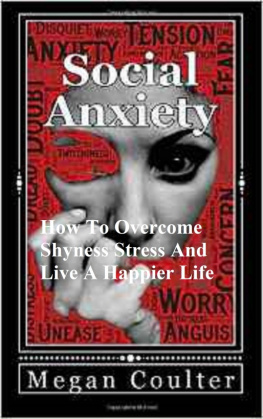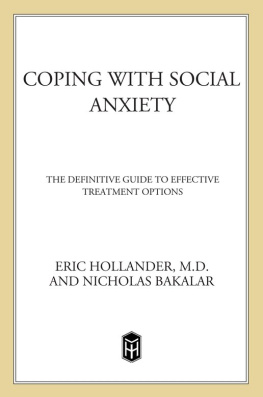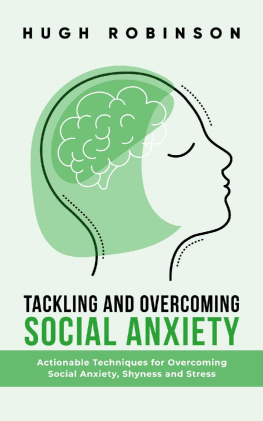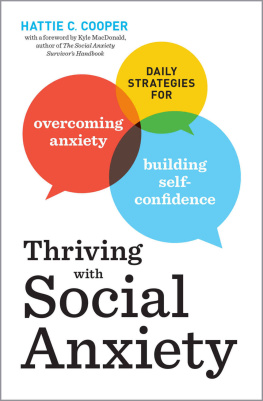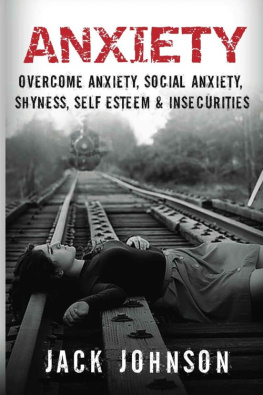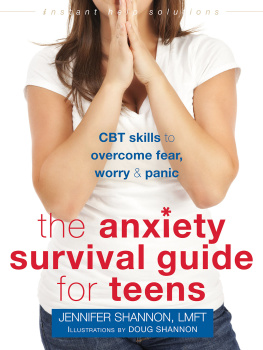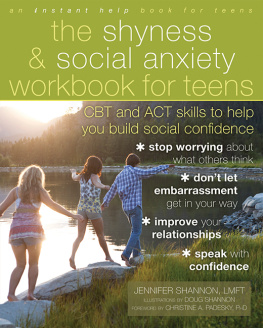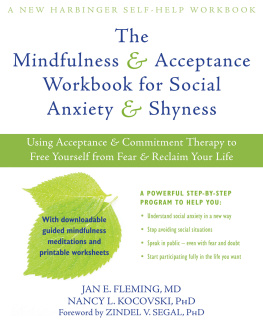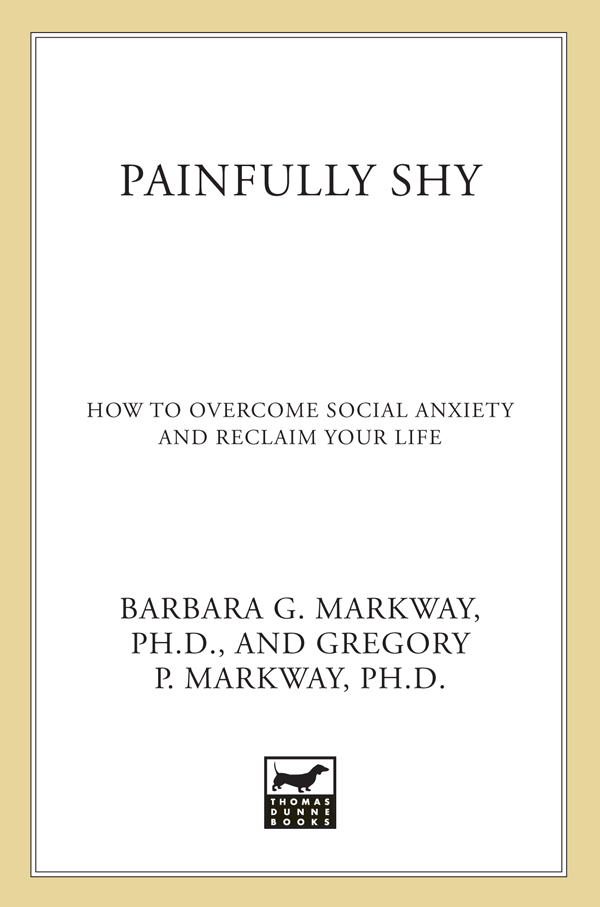Contents
Guide

The author and publisher have provided this e-book to you for your personal use only. You may not make this e-book publicly available in any way. Copyright infringement is against the law. If you believe the copy of this e-book you are reading infringes on the authors copyright, please notify the publisher at: us.macmillanusa.com/piracy.
This book is intended to serve as an informational resource only and should not be taken as psychological or medical advice.
To our clientswhose courage and perseverance inspire us
This book is a result of the inspiration, guidance, and support weve received from many people. Our warmest thanks go to:
Julie McGovern, our insightful freelance editor and friend, for challenging us to make the manuscript better while offering kind words of encouragement along the way. We couldnt have done it without her.
Alec Pollard, Ph.D., and Teresa Flynn, Ph.D., of the St. Louis Behavioral Medicine Institute, for being good friends and able mentors.
Barry Neville, our editor at Thomas Dunne Books, for his vision, and also his wife, Jessica, for putting us in touch with each other. Were also grateful to our editorial assistant, Carin Siegfried, and our copyeditor, Sara Schwager, as well as those other creative people behind the scenes, for working so hard to make this book a success.
Terri Randall and Kristen Gray, for their excellent work on the documentary film, Afraid of People, the first such film to focus on social anxiety disorder. We also want to thank Freedom from Fear for making copies of the documentary available to the general public.
Amy Steffen, good friend and PR pro, for her help and support in promoting Painfully Shy.
Eric Joffe, for his dedication and perseverance in forming the Alliance for People with Social Phobia.
Tracie Smith, Cord Harper, and Joe Bellmer, for spreading the message of hope about the treatment of social anxiety disorder to physicians and mental health professionals.
Melody Boling, Marcia Burton, and their families, for helping with childcare and offering warm support along the way.
Our delightful son, Jesse, for his patience while we wrote the book. As always, his combination of wit and wisdom gently reminds us of whats important and brings much joy to our lives.
Our parents and other family members, for their unconditional love and acceptance.
Life shrinks or expands in proportion to ones courage.
Anas Nin
Everything that is done in the world is done by hope.
Martin Luther
This is a book about people who are painfully shy. But more importantly, its a book about courage. Within these pages youll read about extraordinary men and women who gathered the courage to do things that made them shudder with fright because they realized the only other option was crawling in a hole, hiding from life, failing to realize their potential.
Its also a book about hope, for hope is what creates courage. Sometimes it starts with only a small seed of hope, but thats all it really takes. With the proper tools and the right attitude, that small seed soon grows into a vision of what life can bea life free from crippling fear.
You, too, can loosen the shackles of social anxiety and reclaim your life. And remember, you dont have to do it alone. Well take you through it, step-by-step, supporting you all the way. Read on. Let this book fill you with hope, and may the courageous journey begin.
* * *
Social anxiety disorder, also called social phobia, is extremely common, affecting at least seventeen million people in the United States. Its the most common anxiety disorder and the third most common psychiatric disorder overall. Although theres been a tendency to minimize social anxiety as a minor problem, it isnt. Quality of life can be severely compromised for those with social anxiety disorder. These individuals also run a greater risk for other problems such as depression, substance abuse, and even suicide.
Despite its prevalence and the huge toll it exacts, social anxiety disorder has received little attention until recently. One group of experts has even dubbed it the neglected anxiety disorder. Indeed, in 1992 when I and my colleagues, Cheryl Carmin, Alec Pollard, and Teresa Flynn, wrote Dying of Embarrassment, there was no other self-help book on social anxiety. In contrast, several books could be found on most other anxiety problems, such as agoraphobia or obsessive-compulsive disorder. Individuals with social anxiety suffered in silence, thinking they were the only ones with this debilitating problem.
It has been gratifying to realize the huge need that Dying of Embarrassment filled. Yet, more work remains. Its still difficult to find a health care professional who knows much, if anything, about social anxiety. And finding an experienced therapist can be next to impossible in many parts of the country.
Fortunately, our understanding of social anxiety disorder is reaching a new frontier. Soon it will no longer be a neglected problem. New research findings are proliferating. Special conferences are being held. Professional journals are devoting whole issues to the subject. Newspaper and magazine articles are reporting the news. The word is getting out that social anxiety disorder is highly underrecognized and that effective treatments are available. Our goal in writing Painfully Shy is to continue educating people about the nature of social anxiety, while offering readers the latest information about how to triumph over their social fears.
Who Will Benefit from This Book
Well go over specific definitions and diagnostic criteria in the first chapter. But for now, know that this book is written for anyone who experiences excessive, problematic anxiety in social situations. Maybe youve always thought of yourself as shy but figured this was a part of your personality that was unlikely to change. Or perhaps youve had trouble advancing at work because you offer little input in meetings and refuse to do any public speaking. You may even have been to a psychologist or psychiatrist and received a diagnosis of social anxiety disorder or social phobia. The situations vary, but the fearsthe fear of criticism, the fear of scrutiny, and the fear of disapprovalare the same. This book is written to help you diminish these fears, gain confidence, and feel more at ease in social settings.
Adults arent the only ones who experience anxiety in social situations. Children may also battle problem shyness or be diagnosed with an anxiety disorder. Third-grader Melissa provides a good illustration. Although she is a bright student, she cannot raise her hand to answer a question, nor can she participate in class discussions. She is embarrassed anytime she has to get up from her desk. This means she wont sharpen her pencils, put something in the trash can, or use the rest room. Painfully Shy will help parents, teachers, and school counselors know how to help these children break out of their shells and reach their full potential.
In addition, this book will be useful to family members who often offer the primary social contact for someone with social anxiety disorder. Painfully Shy will show family members how truly to support their loved one. Finally, health care workers, mental health professionals, ministers, and others who have relationships with those who are extremely shy will benefit from understanding more about this common problem.
How to Use This Book


